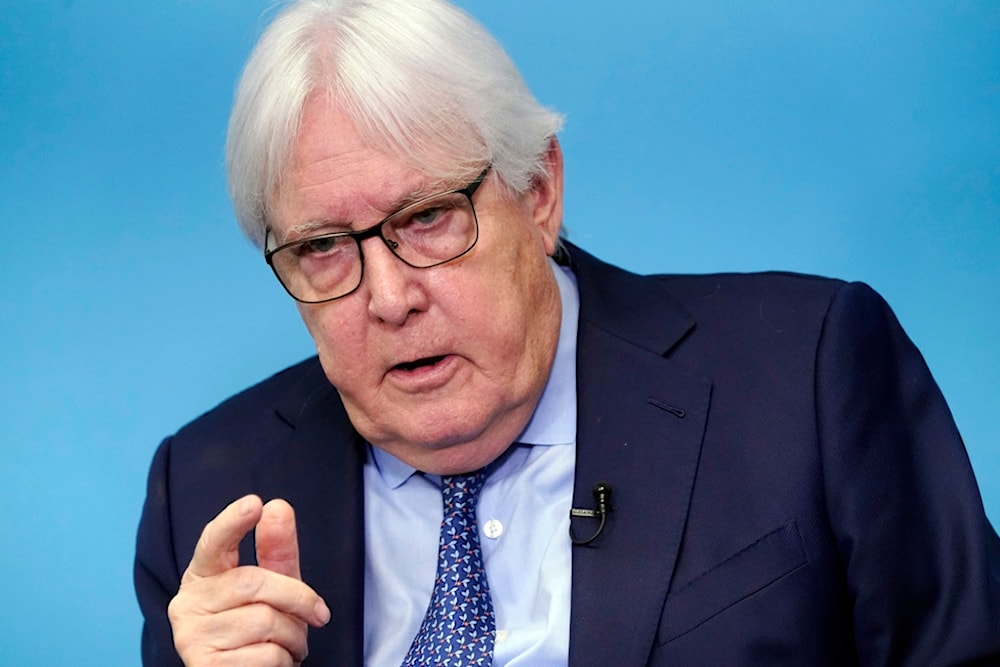UN aid chief decries looming famine in Sudan, Gaza
The UN’s undersecretary-general for humanitarian affairs criticizes the prevention of aid to Sudan and the Gaza Strip amid imminent famine risking the lives of thousands.
-

Martin Griffiths, United Nations Under-Secretary-General for Humanitarian Affairs and Emergency Relief Coordinator, is interviewed at the UN, on Wednesday, June 5, 2024. (AP)
Sudan is experiencing a crisis "beyond imagination," the outgoing UN aid chief warned, with 750,000 people facing imminent famine and conditions expected to worsen, The Guardian reported on Sunday.
Martin Griffiths, the British diplomat retiring as the UN’s undersecretary-general for humanitarian affairs, leaves his position at a time when Sudan and Gaza are both on the brink of historic famines.
Recent statistics from the Integrated Food Security Phase Classification (IPC) revealed that 495,000 Palestinians in Gaza face catastrophic conditions, characterized by “extreme lack of food, starvation, and exhaustion of coping capacities,” over the next six months.
Simultaneously, the IPC estimated that 755,262 people in Sudan are facing similar “phase 5” catastrophic conditions, with an additional 8.5 million Sudanese in a “phase 4” emergency, marked by “acute malnutrition and disease levels are excessively high, and the risk of hunger-related death is rapidly increasing.”
“These are staggering numbers. It’s beyond imagination,” expressed Griffiths in an interview for The Guardian. “I think historically it is a huge moment.”
The British diplomat agreed with US officials’ estimates that without increased humanitarian access and international donations, the situation in Sudan could surpass the historic famine in Ethiopia, which killed 1 million people between 1983 and 1985.
“Sudan is comparable in horror, in potential tragedy, if not worse. But it’s not moving in the right direction, and it’s not getting international attention on the level it should,” he indicated.
He explained that, during the Ethiopian famine, there was massive international focus and generosity, "whereas in Sudan, partly because journalists aren’t given visas to get to places, it’s very difficult to get the story out."
The 2024 Sudan humanitarian needs and response plan, launched late last year, requested $2.7 billion to address the crisis but has only received less than 17% of the needed funds.
Touching on the matter, Griffiths remarked that this reflects the global average response rate for humanitarian appeals.
“Tragically, it’s not that unusual these days,” he noted, adding that “it’s partly because needs have grown, but the funding hasn’t.”
During the ongoing fighting, the Sudanese Armed Forces (SAF) and the paramilitary Rapid Support Forces (RSF) have been accused of hindering mediation efforts and blocking humanitarian aid access.
Particularly in Darfur, the SAF have been accused of preventing aid from crossing the Adré border from Chad. Griffiths mentioned ongoing diplomatic efforts to resolve this, possibly through an inspection regime to ensure no arms accompany food aid. However, he warned that time is running out to avoid the worst scenarios.
Read more: Sudan's army, paramilitary RSF using starvation as weapon: UN experts
'Israel' holds responsibility to ensure humanitarian aid security: Griffiths
Regarding the situation in Gaza, Griffiths claimed that the number of Palestinians facing catastrophic famine had halved since March, when more than a million were at risk, attributing this to the entry of some humanitarian assistance in March and April.
“People can be rescued from famine and starvation and disease if aid is made available, and actually can be rescued quite quickly back from the abyss,” he emphasized.
However, since the partial reopening of Gaza crossings in early spring, the Israeli occupation forces launched an invasion of Rafah, forcing over a million people into central Gaza’s no man’s land, closing and occupying the main Rafah crossing, which obstructs food distribution.
Griffiths underlined that "Israel" holds responsibility under international law to ensure humanitarian aid security, "so it’s not right to say they’re not the problem."
Elsewhere, he pointed to a deconfliction center to coordinate aid movements between organizations and the Israeli military to ensure convoys are not bombed -- a promise made by Israeli occupation Prime Minister Benjamin Netanyahu to US President Joe Biden in April but not yet fulfilled.
Read more: Everyday in Gaza is the worst day the Strip has seen: UNRWA

 4 Min Read
4 Min Read








